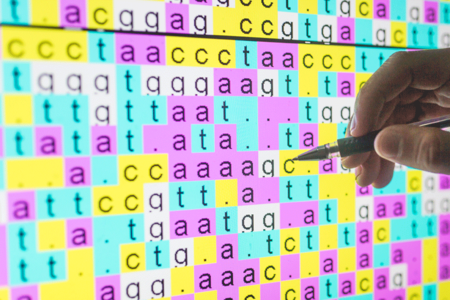About the programme
Considering studying at UCPH this September?
Apply by 15 January if you are an applicant from outside the EU/EEA/Switzerland. Apply by 1 March if you are from the EUAdmission and application
To apply for admission to this master's degree programme, you must have completed a qualifying bachelor’s degree or a similar Danish or international degree programme which is assessed to be relevant. Apply for admission via the application portal.
Below, you can read more about admission requirements and which documents to upload in the application portal.
Academic admission requirements
Here you'll find the different academic requirements depending on which qualifying degree you hold.
You meet all academic requirements if you hold one of the degrees listed below. Learn about when and how to apply. Note, however, that you still need to document that you meet the programme's language requirements.
From University of Aarhus
- Mathematics with the BSc elective subject course package (studieretning) in mathematical modelling or statistics/mathematics (statistics)
If you have a Bachelor’s degree other than those listed above, you must submit additional documentation along with your application so we can evaluate whether or not you meet the admission requirements. Learn about when and how to apply.
If you have a Bachelor’s degree, Professional Bachelor's degree or equivalent from Danish or international universities you are qualified for admission if your programme includes the following:
- Subject elements in mathematical analysis, including measure theory - at least 22.5 ECTS credits
- Subject elements in linear algebra - at least 7.5 ECTS credits
- Subject elements in statistics on a measure-theoretical basis - at least 15 ECTS credits
If you have a Bachelor’s degree in Actuarial Mathematics, Mathematics-Economics or Mathematics from University of Copenhagen you are qualified for admission if your programme includes the following:
- Subject elements in statistics on a measure theoretical basis - at least 15 ECTS.
If you have a Bachelor’s degree in Machine Learning and Data Science from University of Copenhagen you are qualified for admission if your programme includes the following:
- Lebesgueintegralet og målteori - 7.5 ECTS credits (previously called Analysis 2)
- Sandsynlighedsteori - 7.5 ECTS credits (previously called Mål- og Integralteori)
- Matematisk Statistik (MatStat) - 15 ECTS or Matematisk Statistik (MStat) - 7.5 ECTS and Sandsynlighedsteori 2 - 7.5 ECTS credits
We may also admit applicants who, after an individual academic assessment, are deemed to possess educational qualifications equivalent to those required above.
Qualifying degree and other courses/projects
When we assess whether you meet the admission requirements for the Master's degree program, Danish legislation only allows us to assess your Bachelor's degree. Consequently, you cannot study supplementary courses between Bachelor's and Master's degree programs in order to meet the admission requirements.
If you have passed courses/projects before you complete the qualifying Bachelor's degree, these can be included in the assessment, even though they are not part of the Bachelor's degree program.
- It applies to courses/projects you have taken as single subjects and courses/projects you have taken as part of another study program.
- A maximum of 30 ECTS credits of these courses/projects may be included.
International Bachelor’s degree
You can only get an answer to whether or not your degree meets the admission requirement by applying for admission to the MSc Programme. Only the admission committee can evaluate whether you are qualified or not and they only do this once they have received your application.
Bachelor’s degree from Denmark
You are entitled to 1 pre-assessment for 1 study programme, where, based on an assessment of the documentation you have submitted, we will inform you whether you meet the admission requirements.
This is a service offered by SCIENCE, but it is not a service you have to make use of in order for you to apply for admission.
Language requirements
Unless you have a legal right of admission to the programme you are applying for, you are required to document proficiency in English.
Application deadlines
Study start in September
1 March at 23:59
Application deadline for Danish applicants and applicants from within the EU, EEA and Switzerland.
Open for applications from 16 January. You will receive a reply by 10 June.
15 January at 23:59
Application deadline for applicants from outside the EU, EEA and Switzerland.
Open for applications from 15 November. You will receive a reply by 1 May.
How to apply
Choose the category below that fits you and read more about how to apply for admission. You will also find information about application deadlines and documentation on the websites.
Citizen in Denmark, EU EEA or Switzerland
Bachelor’s degree from Denmark
International bachelor’s degree
Citizen in a country outside EU, EEA or Switzerland
Bachelor’s degree from Denmark
International bachelor’s degree
Prioritisation of applicants
If the number of qualified applicants to the programme exceeds the number of places available, applicants will be prioritised according to the following criteria:
- Total number of ECTS credits within mathematics and statistics
Limitation on second degrees
If you have already completed a Master's degree, please check out the rules concerning a second degree.
| Admission statistics Statistics 2024 | |
|---|---|
| Admitted | 29 |
| Admission distribution (legal right/other) | 0% / 100% |
| Applicants | 65 |
| Age average | 25 |
| Legal gender distribution (cpr. - m/f) | 59% / 41% |
| Nationality (dk/international) | 69% / 31% |
| Available spots | No |
Programme structure
The programme consists of four compulsory courses, a number of restrictive elective and elective courses, and a Master’s thesis.
The compulsory courses give you a common theoretical and practical foundation. Through these, you develop the mathematical theory of a range of widely used statistical models and standard methodologies. The courses also develop some of the computational and practical tools you need to apply those models and methods for analysing data.
You can compose the elective elements of the programme so that the focus is on mathematical or theoretical aspects of statistics, or on more practical, computational, or applied aspects of statistics.
Do a Project in Practice or Study Abroad
You can use some of your elective courses to do a Project in Practice in collaboration with a company or an organisation. You can also choose to study abroad as part of your programme. Read more here:
Master's Thesis
You conclude the programme with a Master’s thesis, where you treat an academic problem in statistics in depth. Your thesis can be purely theoretical, or it can have a major applied component. It can be done in collaboration with researchers in other areas, a public institution, or a private company.
Programme Overview
Compulsory courses: 30 ECTS
Restricted elective courses: 30 ECTS
Elective courses: 30 ECTS
Master's thesis: 30 ECTS
One block each year equals nine weeks of study and 15 ECTS. The table is primarily for guidance and may be subject to revision.
Year 1
| Block 1 | Block 2 | Block 3 | Block 4 |
|---|---|---|---|
| Restricted elective course | Restricted elective course | Restricted elective course | Restricted elective course |
| Regression | Statistics A | Statistics B | Project in Statistics |
Year 2
| Block 1 | Block 2 | Block 3 | Block 4 |
|---|---|---|---|
| Elective course | Elective course | Thesis | |
| Elective course | Elective course | ||
Restricted Elective Courses
Choose your restricted elective courses from the list below. Click on each course for a detailed description.
- Advanced Topics in Deep Learning
- Advanced Vector Spaces
- An Introduction to Large Deviations
- Applied Probability
- Applied Programming
- Brownian Motion
- Causality
- Computational Statistics
- Deep Learning
- Differential Operators and Function Spaces
- Financial Econometric Time Series Analysis
- Functional Analysis
- Geometry 2
- Inference for Stochastic Differential Equations*
- Interpretable Machine Learning
- Introduction to Extreme Value Theory
- Machine Learning A
- Machine Learning B
- Mathematical Modelling in Infectious Disease Epidemiology*
- Models for Complex Systems
- Monte Carlo Methods in Insurance and Finance
- Numerical Optimization
- Online and Reinforcement Learning
- Point Processes*
- Probabilistic Machine Learning
- Semiparametric Inference
- Stochastic Processes in Continuous Time
- Survival Analysis
- Targeted Learning*
- Topics in Probability
- Topics in Statistics
* The course is not offered in the academic year 2025/26
Curriculum
Learn more about the programme in the: Curriculum for MSc in StatisticsShared section of the curriculum
Please note: The programme curriculum is for the current academic year. A revised curriculum for the coming academic year will follow.
Video: Helle and Milos talk about Statistics
Career opportunities
Statisticians are employed in a diverse set of jobs. You find statisticians working on design and data analysis in experimental trials, or working in banks, insurance companies, and pension funds to optimize investments, analyse data for fraud, or forecast the demographic development.
You also find statisticians within public health or econometrics, e.g., providing support for public policy decisions, as well as working in the tech-industry dealing with software development for data analysis.
Some core problems that statisticians work with are:
- Causal inference: how to design experiments, collect data, and analyse data correctly to be able to draw conclusions about cause-effect relations.
- Prediction and forecasting: how to build and validate machine learning models to give accurate, fair, and explainable predictions.
- Methodological development: how to improve either the mathematical framework, and/or the software implementations to yield better and faster results.
The MSc programme in Statistics provides more than specific and contemporary solutions, which can quickly become outdated. You will get a lasting foundation for dealing with these questions so you can continue to develop state-of-the-art solutions throughout your career.
Competence Description
As a graduate you will have the competences to:
- critically and independently conduct data analysis from experimental or observational studies
- transform statistical research literature into solutions of specific statistical problems
- develop new statistical methodology
Employment
Being a statistician, you are in high demand and there is virtually no unemployment. Statisticians find jobs in, for instance:
- the pharmaceutical sector
- the financial sector
- research
- IT and technology
Some statisticians are employed at universities as scientists or teachers. This requires you to get a PhD. Others work as consultants or as private entrepreneurs.
Student life
High quality education in English, a flexible study structure, excellent facilities, an international study environment, attractive and green campus areas, and the opportunity to experience life in Copenhagen, the cool capital of Denmark. These are some of the qualities about studying at Faculty of Science (SCIENCE) at University of Copenhagen that you can expect.
Throughout the year, various social activities are arranged for all SCIENCE students and for international students specifically. These activities include:
- Introduction Days for new students
- A welcome programme for international students
- International dinners, courses, and lectures
- Sports activities such as fun runs or bicycle races
- Career workshops
Students live in residence halls outside campus or share a flat in the Copenhagen area. You will find that the relatively small size of Copenhagen makes it easy to get around, even by bike.
Where Will I be Studying?
The Statistics programme is primarily based at North Campus.
Here you will find some useful links and videos about student life and housing in Copenhagen, and the welcome programme for international students at Faculty of Science.
- Information about living in Copenhagen – plus practical information on housing, civil registration number, residence permit and more
- General information on student life and studying at University of Copenhagen
- Housing Foundation Copenhagen is an independent entity which assists international students and researchers at University of Copenhagen in finding accommodation. Visit Housing Foundation Copenhagen here
Video: Study Science at University of Copenhagen
Meet Elizabeth and Alex who study at the University of Copenhagen in Denmark. See what it is like to live and study in Denmark.
Video: SCIENCE Welcome Programme
The SCIENCE Welcome Programme is a great way for international students to be introduced to the Faculty of Science at the University of Copenhagen.
The University’s North Campus is centrally located. It is home to scientific, pharmaceutical and health science research, and neighbour to the Copenhagen University Hospital (Rigshospitalet), Metropolitan University College, and Fælledparken.
Many exciting building activities are going on at the campus areas at the moment, including the construction of a new Natural History Museum and the Niels Bohr Building. Furthermore, North Campus is part of a coherent district of science, health and interdisciplinarity – Innovation District Copenhagen – which is being developed these years.
You can read more about campus life at the university here:
Testimonials
Read interviews with students from the Master of Science programme (MSc) in Statistics:
“The great thing about statistics is that you deal with quite advanced mathematics, while applying it in a more concrete way,” says Frederik Riis Mikkelsen, who is in the second year of his master’s programme.
Why did you choose Statistics?
I started directly on the bachelor’s programme in Mathematics without any gap year. I think I chose it because I enjoyed mathematics in upper secondary school. Most other subjects were not as fascinating. But I ultimately just had to choose something. I was in some doubt, but decided to try the bachelor’s programme in pure mathematics, and after that went well, it seemed natural to continue.
You don’t really know what mathematics is when you start your studies. I thought it would be a bit like my classes in upper secondary school – working with numbers and formulas. But mathematics at university level is far more abstract.
Statistics is also quite theoretical here at the University of Copenhagen, but you get the feeling that it can be used for something concrete from the outset. Mathematics can also be applied, of course, but on the Statistics programme you get to work with data, say, from Rigshospitalet, i.e. from the real world – perhaps from testing a drug or a new treatment, and it is up to you to draw a conclusion.
Mathematics is more about asking: Can this result be true? Let’s try to prove it! It’s only afterwards that you consider whether the result fits into a larger context.
What is the best thing about Statistics?
That you deal with something that is quite advanced mathematically, yet also with more concrete applications. Statistics is systematic without being black and white – there are multiple ‘truths’. Your conclusion depends on how you approach the problem. That’s one of the good things about it.
Another cool aspect of statistics is the eye-opening experiences you get. This typically happens when you hear something that goes against your intuition. For example, Simpson’s paradox – which I will try to explain:
A US study looked at the number of people who were accused of murder, and particularly at the proportion that received a death sentence. It found that among those accused of murder who had pale skin, the proportion sentenced to death was greater than for those accused of murder with dark skin.
This is not in itself a paradox, but they found something very strange if you also took into account the skin colour of the victim. If you have two murder suspects, one of each skin colour, and you don’t know the victims’ skin colour, the accused with pale skin has the highest risk of being handed the death penalty.
On the other hand, if you know the victims’ skin colour, the accused with dark skin colour has the greatest risk of being handed the death penalty.
You wouldn’t expect such a thing to be a possible. That was a real eye-opener, but also a bit gloomy.
I had many ‘gosh’ experiences at the beginning, and I still get them. They show how easily you can get things wrong when working with statistics, so you have to be careful.
Which subjects do you do?
You start off with probability calculations and theory. This is supplemented by basic statistics courses and learning basic concepts and how to get the computer to understand and compute data. Then you learn more advanced methods for more specific purposes, and which models are good for certain things.
You learn to be critical. Many people think statistics are definitive – you can see this in the way the media use them. By choosing your words carefully, you can make almost anything appear true. That’s why it’s good for statisticians to be critical.
The programme is well structured: you have about 15-20 hours of lectures and classes a week, where you start with the basics, and you can already choose a specialisation from the first year.
What specialisations can you choose?
You can work with simulation studies, where you do calculations for certain scenarios.
Advanced regression analysis is another field. This involves finding a good correlation between two variables, e.g. whether there is a correlation between your postcode and the risk of being involved in a traffic accident. And then there is time series analysis, where you observe something like interest rates and see how they change over time.
From an outsider’s perspective it may seem a little dry. Is it?
Yes, perhaps, but I would say that in the end you are creatively challenged. You might have a problematic dataset, for example because of missing or incomplete data. Then you have to feel your way forward and decide how cautious you need to be. When working with data and statistics, you have to constantly read the situation.
Your conclusions will ultimately influence decisions in the real world. I think about this a lot, especially if the data I’m dealing with is disease-related. Then the data represents human beings, and if I’ve been given responsibility for processing the data, wrong handling by me would affect the lives of many people.
This might seem daunting, but it’s good to know that your work may contribute to helping other people.
What is the social life like?
It’s really good. There’s a positive study mindset, because people are both committed and interested academically, but you also know each other personally. There are plenty of interesting events for students, and the parties are fun.
There’s also our study bar, ‘Cafeen?’, which I use from time to time. When I started studying mathematics, the tutors made sure that we got off to a good start with our studies, without forcing everybody to be together all the time. In the beginning, you are very much ‘on your toes’, but over time I have become more positive and relaxed.
Would you recommend the programme to others?
Absolutely. If you feel that working with numbers is fun, I can recommend it. There’s a good study environment and you learn a lot of different things. I threw myself into it, and ended up really enjoying it. I have no regrets.
Interview with Jon from Iceland, MSc in Statistics:
I lived in Copenhagen for three months and really enjoyed the relaxed atmosphere the city has to offer. This was when I decided that I wanted to move to Copenhagen when I finished my Bachelors degree.
I had already chosen theoretical statistics as my main subject and the combination of theoretical statistics and Copenhagen lead to the University of Copenhagen. It also played a part in my decision that there are a lot of Icelandic people in Copenhagen and among them some of my friends.
The conditions for a statistics student here are good. The department is small in terms of students and the staff-student ratio is probably a lot higher than in many bigger departments. As a result the relationship between students and teachers is more personal and you get more help than you would get in a bigger department.
The range of courses available, both theoretical and applied, and the level of teaching is also surprisingly good. My fellow students have also been helpful and nice to me so I cannot complain about anything.
Copenhagen is a great city to study in. The first thing that you notice is the number of bikes you see in the streets. I almost always use my bike when I have to travel and in addition to being a quick and a efficient way of travelling it is also pleasant exercise. Copenhagen also has a lot to offer apart from a good student environment; there are a lot of nice coffee shops and kebab places all around town and there are surprisingly many concerts held in the city.
My favourite thing about Copenhagen is definitely the number of public gardens, and there is not a lot that compares to sitting in a public park in good weather with friends and beer. In general Danes are nice and helpful people. I would definitely recommend the statistic department at University of Copenhagen to other students and there are probably not a lot of places that are better than Copenhagen to experience new things, learn a new language and meet a new culture. I have recently graduated from the masters program at University of Copenhagen. I have been accepted on a PhD program in the USA.
Contact student guidance
Contact SCIENCE Student Service
Do you have questions about the programme structure, study or career opportunities, admission requirements or application procedure, please feel free to contact SCIENCE Student Services.
Contact SCIENCE Student ServicesLocation
- Faculty of Science, North Campus, Universitetsparken 5, DK-2100 København Ø.





